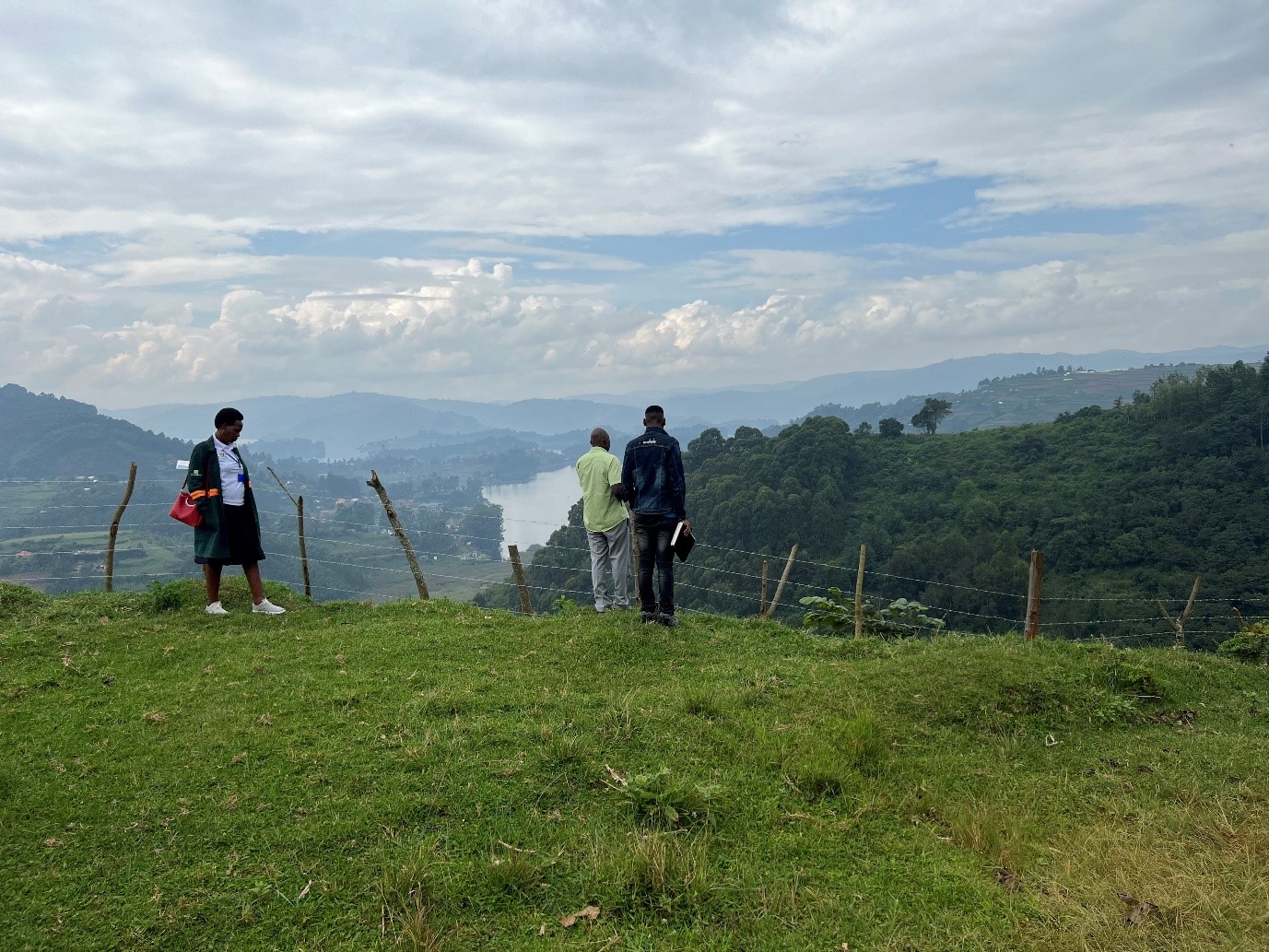Research image of the month - flood resilience, community voices, and a panoramic perspective

This month’s research image of the month (June 2025) encapsulates Claude Nsobya’s research on how communities are leading the way in managing flood risk through local knowledge and natural solutions. Claude points out the importance of the two-way flow of knowledge and experience, from community to academia and back again, so that we can work together to find sustainable and scalable responses to the climate crisis.
In Claude’s own words…
“When this image was taken in Kabale, Uganda, I never imagined it would be recognised as the Open University's (OU) research image of the month for June. For me, it’s more than just a beautiful photo, it’s a story of risk, resilience and community ingenuity captured in one stunning panoramic view.
“In the foreground of the image, you see myself (holding the book) with two of my participants looking out over a vast valley, with a lake and steep hills stretching into the distance. These hills represent both the threat and the opportunity in my research: the steep slopes make this area particularly vulnerable to flash flooding, yet the communities here are actively managing this risk through natural flood management techniques. Terracing, contour bands, tree planting, and the preservation of native vegetation are all evident — you can see some of this just visible at the edge of the frame, and many more below our feet out of sight.
“My research explores community resilience to flooding in both Uganda and the UK. In Uganda, I’m working closely with local communities who are implementing flood mitigation strategies based on traditional ecological knowledge. My framework for assessing community resilience includes ‘natural capacity’ - how nature itself, supported by human actions, can reduce flood risk. These communities aren’t just passive recipients of aid or knowledge; they are active agents, forming committees, driving sustainable interventions, and sharing what works.
“My interest in this area stems from personal experience. I first became concerned with climate extremes while researching drought risk in my father’s village during my undergraduate studies in Uganda. That connection to place and community has shaped my entire academic path - from studying Environmental Science in Uganda to a master’s at the University of Oxford, and now a PhD at The Open University. Along the way, I’ve worked at Uganda’s Ministry of Water and Environment, which first introduced me to flood management projects like the one depicted in this image.
“I chose this photo because it represents the power of community-led solutions. It captures both the scale of the challenge in this beautiful vista, and the human determination to live with and manage risk. It shows how, even in the face of climate change, we can find sustainable ways to thrive. More than that, it highlights the quiet, impactful work happening far from the headlines - people working not against nature, but with it.
“Being selected for Research Image of the Month is deeply meaningful to me. It validates the work these communities are doing and helps amplify their voices. It’s imperative to utilise local knowledge and hear lived experience in our research to ensure the sustainability of solutions. I also believe this research aligns closely with The Open University’s mission: to be open to people, places and ideas. This image isn’t just about a project in Uganda - it’s a demonstration of what happens when knowledge flows both ways, from community to academia and back again.
“I hope this recognition can be a platform to influence policy, especially around empowering communities to take charge of their own flood resilience. I’ve already co-authored work with a Ugandan participant, and I’m hopeful that the outcomes of my research will shape more inclusive and effective strategies for flood risk management - not just in Uganda or the UK, but wherever communities face similar challenges.”

You can read more about Claude Nsobya’s work in his recent co-authored paper ‘Roles and benefits of community involvement in implementing Natural Flood Management in Maziba catchment, Uganda’.
Contact our news team
For all out of hours enquiries, please telephone +44 (0)7901 515891
Contact detailsNews & articles

OU researchers lead international advances in planetary protection
Open University researchers are leading international advances in planetary protection, helping ensure that space exploration is safe, sustainable, and scientifically rigorous.